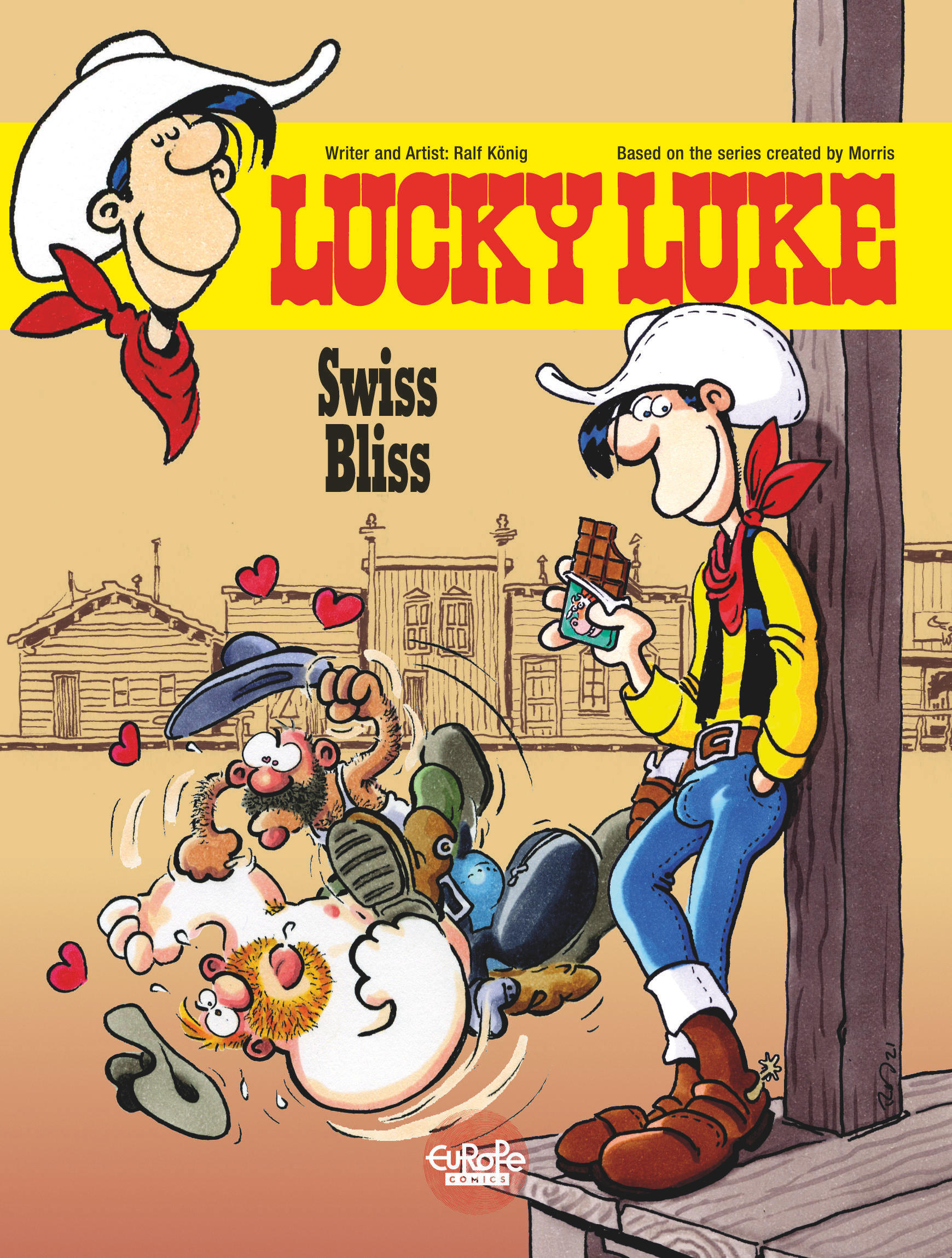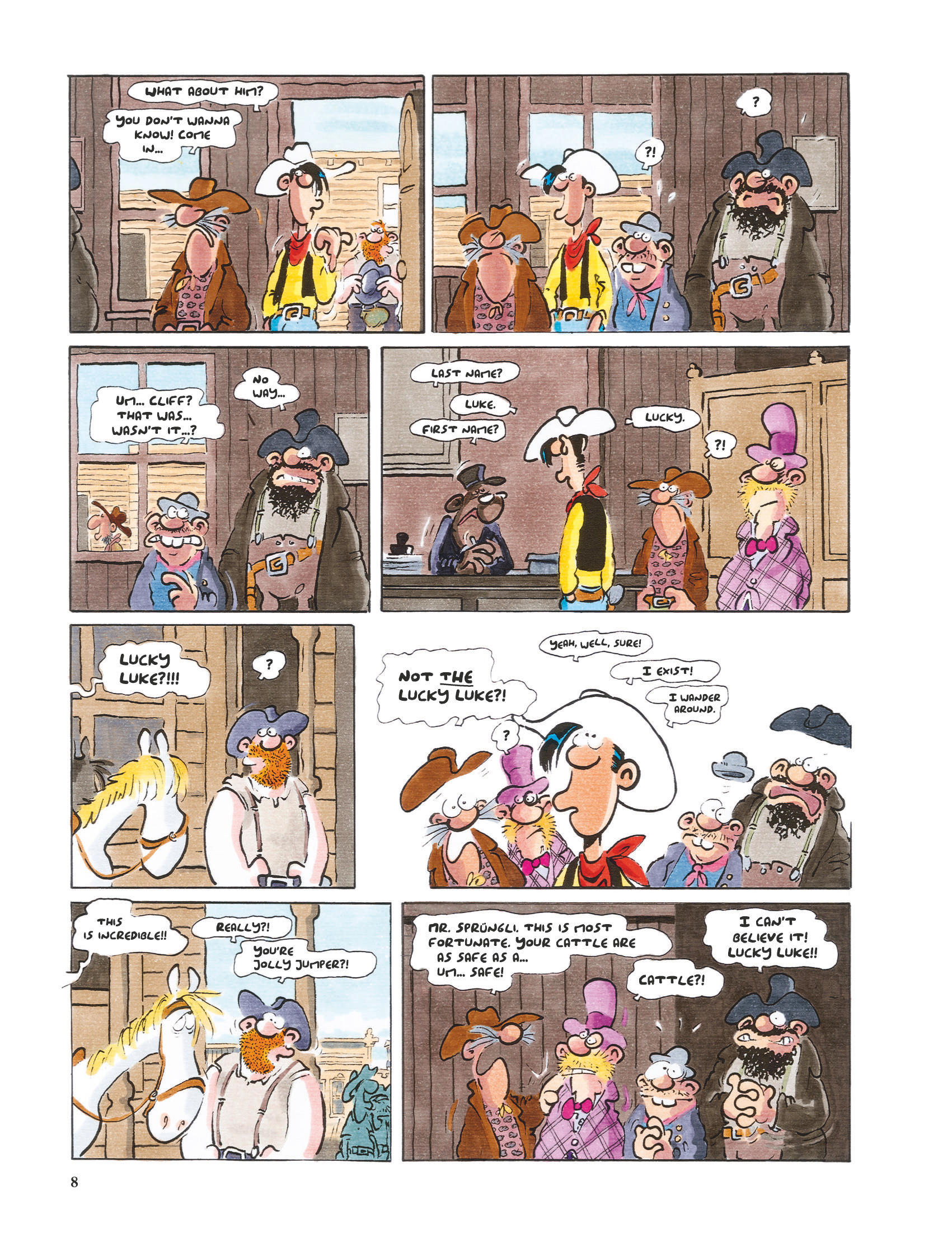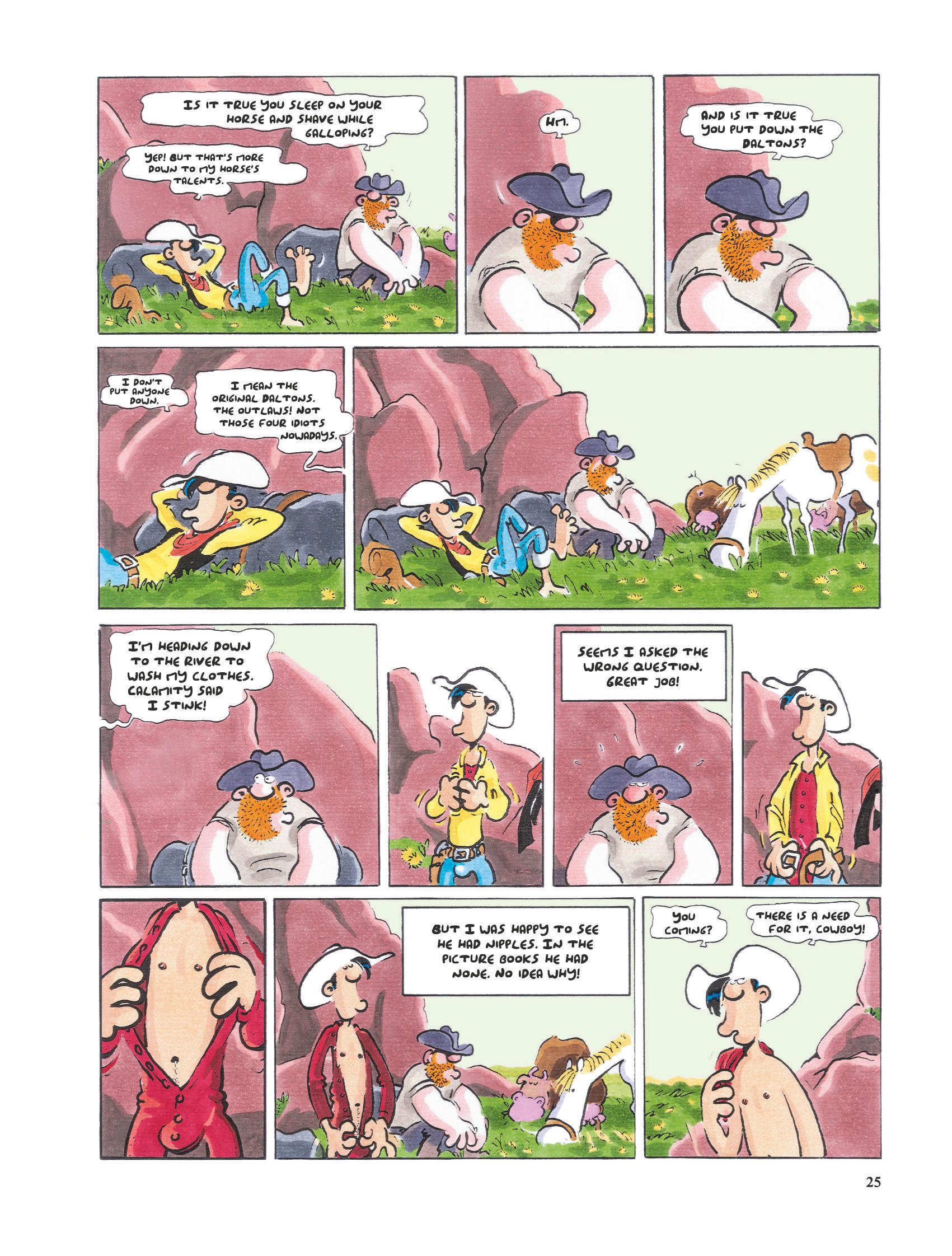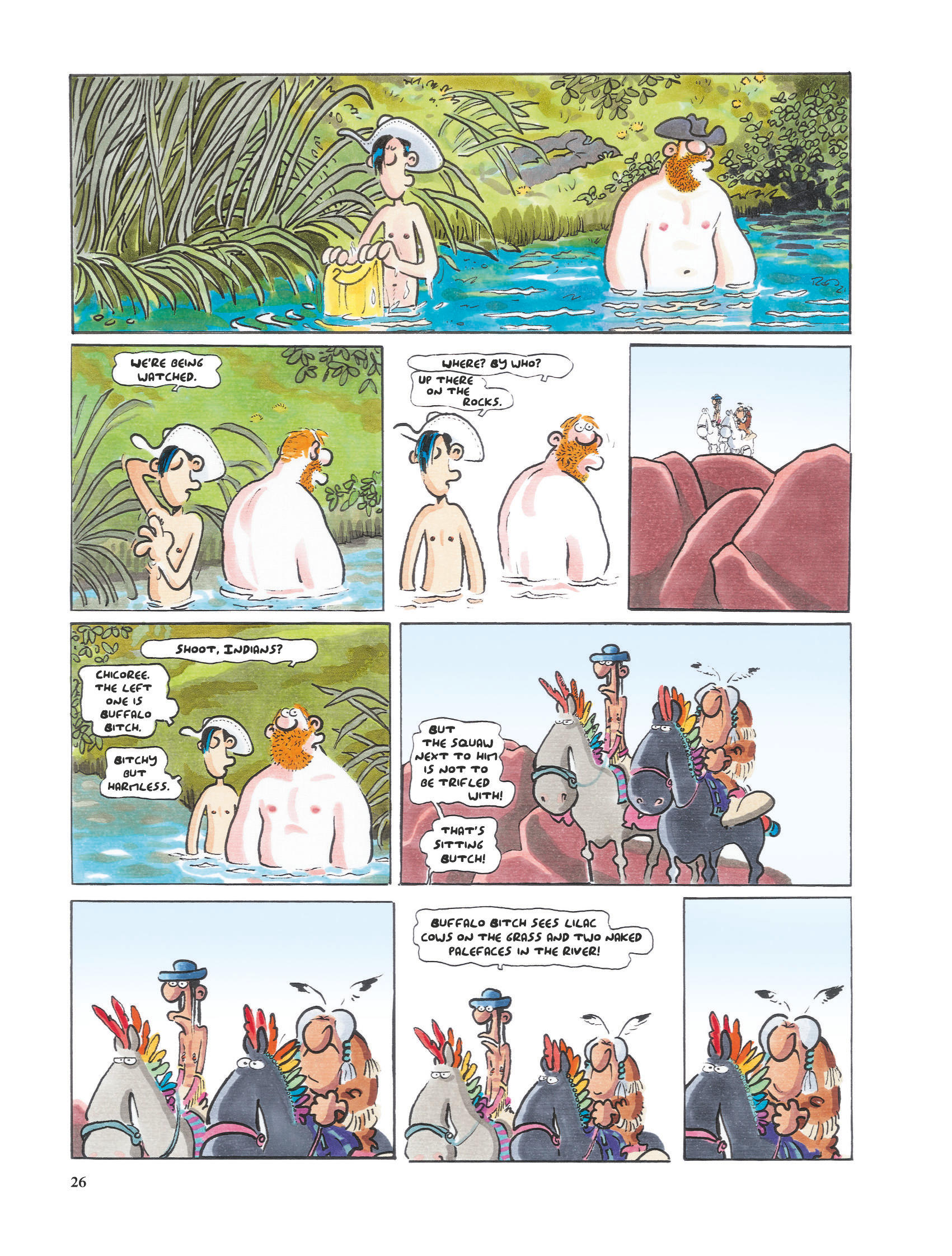 On November 25th, Europe Comics published Ralf König’s Swiss Bliss, the German artist’s take on Lucky Luke. König came out as a gay man in the late 70’s and has been publishing comics teeming with sexuality for the past 40 years, to great success. His books have been translated into fourteen languages and sold upwards of seven million copies. In 1990 he won Best German Comic Artist at the Grenoble BD Festival and Best International Comics Artist at the Barcelona International Comic Fair in 1992. In 2009 his Prototype won Best Comic Of The Year at the Frankfurt Book Fair. Four movies have been made from König’s work, with 1994’s Der Bewegte Mann (published in English as Pretty Baby) becoming the second most successful film in German history with its 6.5 million viewers grossing $43 million at the box office and earning a Federal Film Prize. Kondom des Grauens (The Killer Condom), Wie die Karnickel (Like Rabbits), and his adaptation of Aristophanes’ Lysistrata all also received favorable reviews, Wie die Karnickel winning the Prix Alph’Art for Best Scenario at the 2005 Angoulême Festival. In 2012, König was the subject of Rosa von Praunheim’s König des Comics (‘King Of Comics’) documentary.
On November 25th, Europe Comics published Ralf König’s Swiss Bliss, the German artist’s take on Lucky Luke. König came out as a gay man in the late 70’s and has been publishing comics teeming with sexuality for the past 40 years, to great success. His books have been translated into fourteen languages and sold upwards of seven million copies. In 1990 he won Best German Comic Artist at the Grenoble BD Festival and Best International Comics Artist at the Barcelona International Comic Fair in 1992. In 2009 his Prototype won Best Comic Of The Year at the Frankfurt Book Fair. Four movies have been made from König’s work, with 1994’s Der Bewegte Mann (published in English as Pretty Baby) becoming the second most successful film in German history with its 6.5 million viewers grossing $43 million at the box office and earning a Federal Film Prize. Kondom des Grauens (The Killer Condom), Wie die Karnickel (Like Rabbits), and his adaptation of Aristophanes’ Lysistrata all also received favorable reviews, Wie die Karnickel winning the Prix Alph’Art for Best Scenario at the 2005 Angoulême Festival. In 2012, König was the subject of Rosa von Praunheim’s König des Comics (‘King Of Comics’) documentary.
From short stories to epic length books, with serial characters such as Konrad and Paul, or revitalizing the classics such as Aristophanes and Shakespeare, König’s range is wide. And why shouldn’t it be? His stories pulse with much life, offering humorous and moving looks at relationships in general, the universal complications of all types of love. Nevertheless, when I got the email to write about his Lucky Luke, it was presented to me as possibly being controversial due to the appearance of LGBTQ elements in Morris’ long-running kids’ series. There’s nothing contentious about it, though. It’s simply a good story. And, like so much of König’s work, really funny too, packed with puns and hilarious innuendo.
Lucky Luke, seen now for the first time with nipples and a bulge in his pants, wanders into the backwater town of Straight Gulch and proves himself to be an ally as he confronts the homophobia and hostility of its residents. In particular, this is directed at two young men who are being ostracized for getting ‘closely acquainted’ during a job on Bareback Mountain. Just as Lucky Luke believes in being left alone to do his thing, he extends this same non-judgmental courtesy to the cowboys in question. But of course life never goes that smoothly, especially when Calamity Jane, The Daltons, and a host of other colorful characters get involved. Ralf König was kind enough to take the time to answer my questions via email about the creation of this unique chapter in the life of our beloved Wild West hero.
Aug Stone: Did you grow up reading Lucky Luke?
Ralf König: Yes, of course. There weren't many comics when I grew up in Germany except Donald Duck, Asterix, and Lucky Luke. I always thought Lucky Luke was the best.
What are your thoughts on Morris' work?
I didn't understand it when I was a kid, but this loose, scribbled line by Morris, that's what still fascinates me about drawings today. It all looks quick and spontaneous. I love that. I also adore Claire Bretecher for similar reasons. It's that free but sure stroke that also allows for coincidences. Most comics nowadays bore me, as soon as someone draws with a computer tablet, it's half dead. Too perfect, too round, too colorful, too saturated. with Morris, you can still see the ink pen, and yet everything is almost cartographically exact. There's no tuft of grass just standing around somewhere. Great.
What is your favorite Lucky Luke book and why?
I think the first album my mother bought me was Calamity Jane. I was smitten with this cursing, chewing tobacco spitting, gun wielding lady. I knew the album by heart! That's why she had to be in my album, that was clear from the start. I recently saw a documentary about who Calamity Jane really was. She was more of a tragic figure, with alcohol problems and difficult relationships. But she walked around in men's clothes, and did her thing as a woman back then. She's immortalized in Lucky Luke, just like the Daltons. They would certainly have found it strange if they had known that they would later be remembered not as feared bandits, but as joke figures in a comic.
Tell me about writing Swiss Bliss. When did the idea come to you? Was any of it difficult?
My friend works at Ehapa, the publishing house that publishes Lucky Luke in Germany. I had seen those tribute volumes, including the one by my German colleague Mawil, and I must have sighed out loud at the breakfast table that I'd like to draw Lucky Luke, too, but I can't draw horses and the western setting would be too much for me. So I wasn't serious, but my friend told his publisher about it and they got really excited right away. There was a serious talk with the editor and then I had the job on my hands. I really respected it. Then I had a reading in Zürich, and on stage they gave me a box of very high-quality Swiss chocolate. Made from rare, wild cocoa beans and stuff. That gave me the idea of when chocolate came to the Wild West, because as a cowboy, Lucky Luke could have something to do with cows. Unfortunately, chocolate didn't come to the Wild West until about 50 years after Lucky Luke, if he had lived at the time of Abraham Lincoln, which is the case with Morris. But that wasn't so important. I had the idea of valuable imported cows, and rustlers as villains. That was the starting point. But then it all came differently, because I never work from a pre-written fixed script. That would bore me and I have to be surprised myself with what happens on the next page. That keeps it fun for me. And I also knew there had to be a gay cowboy story. Otherwise I wouldn't have done it. I had to stay true to myself, with all due respect to Lucky Luke.
The book was pitched to me as being "controversial", though I didn't find it to be so. I just thought it was a good story with lots of humor. How do you view the book within the context of the world of Lucky Luke? Do you see anything controversial about it? Has there been any sort of backlash to it?
No, I don't see it as controversial either. But someone who has problems with gay cowboys will see it differently. Of course it's about homophobia, but to me the joke is more important. I'm not a queer activist. I'm a comic artist and gay, so I draw comics from my gay point of view. I don't want to lecture or enlighten anyone, but of course I don't mind if that happens. Usually my books are full of characters who live their gay self-confident lives very naturally. I've never drawn a coming out story. That was different with Lucky Luke, also because I had this Brokeback Mountain idea, which my story is based on. Whoever thinks Lucky Luke is a kids' comic and therefore shouldn't have anything in his pants might see it as controversial.
How much of your own experience informs the work and characters?
A lot, I suppose. I've been drawing comics for forty years, and forty years ago I had my coming out as a gay man. That's when I made some observations, especially about myself. I'm influenced by the American underground comix, so Robert Crumb, Gilbert Shelton... I discovered my father's porn in the closet when I was eleven, and the comics of Fritz the Cat. Sexuality is indispensable in my stories, in my imagination. And I'm glad I'm gay, so I escape the current gender discussion. If I did to women what I do to men in my stories, I'd already be the nation's asshole. When gay men meet gay men, different and much simpler laws of coexistence apply. That's also the reason why I'm read by a lot of straight people in Germany and Spain. It must be very appealing to be able to deal with sexuality in such a relaxed way. A good third of my readers are women. So yes, there's something of me in all my characters, of course. Especially in Konrad and Paul (from König’s series Konrad und Paul). They're two souls in my chest.
Are there real life examples behind the repressed homosexuality of the uncle and nephew? Or a real life example for the autograph hunter?
No, the uncle and nephew are fictional. They were supposed to be the rustlers, but then the story took a different turn. I found it exciting that Lucky Luke is already a picture book hero in his world, that the Lucky Luke albums already exist in the Wild West. I got the idea from a Brad Pitt movie about Jesse James. He was also a dime novel hero when he was alive. There were cheap transfiguring novel booklets about him that didn't have much to do with his person. That's what I did with Lucky Luke, which also explains why he's not as beautifully drawn for me as he is for Morris. And then the rustlers became autograph hunters, and I needed new bandits. I didn't know on page 39 that the Daltons would show up on page 41. That's how I work. It can go wrong dramaturgically and lead to a dead end, but it would bore me to draw according to a fixed script. With Lucky Luke it worked wonderfully. I came out exactly on page 63. I was worried at times that I wouldn't be able to fit in all the ideas on the limited number of pages. And yes, I see these autograph hunters, these nerds, at comic festivals. The guy in the comic is of course an affectionate dig.
Brokeback Mountain is referenced throughout. What are your thoughts on this film?
It's worth reading the short story on which the film is based. I found the film very moving, but there was a lot in it that was meant to appeal to straight tastes. The all-too-pretty rodeo rider who marries the gay cowboy doesn't even come up in the short story, for example. There the film took some liberties. But it's the only gay western you've seen so far, although it's not really a western. But the romance of two cool guys in the middle of the vast landscape was terrific. It was fun to quote that in my Lucky Luke.
I really liked all the references in the book, especially naming a character Terence McQueen, being Steve McQueen's given name. Anything to say about these?
Oh, I didn't even think of Steve McQueen. Maybe unconsciously. I have a gut feeling and that doesn't reflect every idea. Yes, I enjoyed the names too, Buffalo Bitch and Sitting Butch and so on. By Terence and Bud, I meant (Terence) Hill and (Bud) Spencer. Unfortunately they made very foolish films, or the German synchronization of the 70s ruins everything. Anyway, Terence Hill was a very sexy guy and I would have liked to see him with Bud Spencer doing something other than just beating people up and saying stupid things.
What are you hoping readers will get out of the book?
I'm modest about it. If people have an hour or two of fun and joy with the memories of their Lucky Luke heroes from back then, I'm happy. It was an honor to be allowed to draw that! As a child, I loved the cowboy and also found him sexy with his fine black neck hair. I always drew the missing nipples on him with colored pencils, I thought they had been forgotten. And now, 50 years later, I'm officially allowed to draw the cowboy's nipples and a little bulge in his pants. I'm really a bit proud of that. Also that it went so well and I didn't have any restrictions from the publisher, except that Lucky Luke shouldn't smoke and shouldn't be gay. Why should Lucky Luke suddenly be gay after 75 years? That was never my idea.










